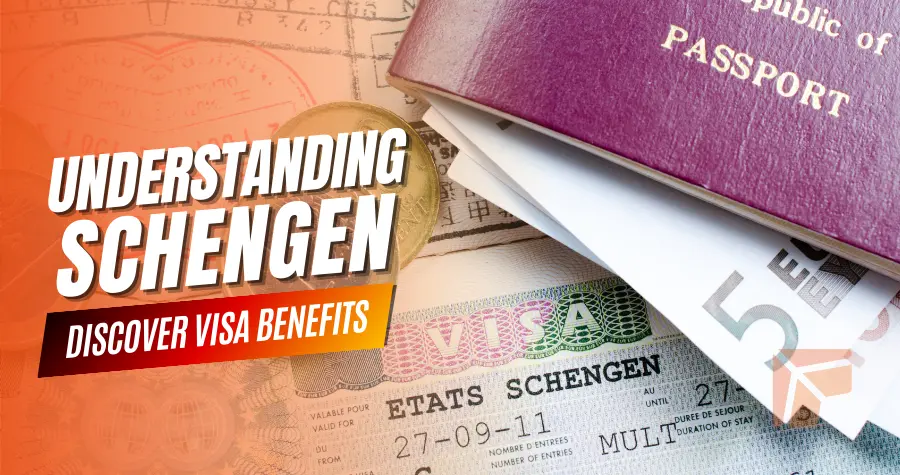May 30, 2024
Everything You Need to Know About Getting a Schengen Visa
By Jiyamol Joy
Let's dive into the world of the Schengen Visa—your ticket to breezing through 26 European countries without a hitch. Wondering what a Schengen Visa is? It’s a must-have travel document if you’re looking to hop from one European country to another. The Schengen Visa enables holders to travel freely within the Schengen Area, significantly simplifying travel for tourism and business purposes alike. This guide will help you understand the fundamental aspects of the visa, offering essential information and expert advice to enhance your understanding and assist in facilitating a successful application. By comprehending the requirements and processes involved, travelers can ensure a smooth and efficient journey throughout Europe.
Exploring the Schengen Area with a Single Visa
The Schengen Visa serves a vital role in enhancing economic and cultural exchanges by allowing unrestricted movement within the Schengen Zone. This visa streamlines the travel process, eliminating the need for multiple visas and making cross-border travel effortless among its member countries. Comprising major European destinations like France, Germany, Italy, and Spain, the Schengen Area offers travelers the unique opportunity to immerse themselves in a rich tapestry of cultures, breathtaking landscapes, and historical sites without the hindrance of border checks. The countries within this zone include Austria, Belgium, Czech Republic, Denmark, Estonia, Finland, Greece, Hungary, Iceland, Latvia, Lithuania, Luxembourg, Malta, Netherlands, Norway, Poland, Portugal, Slovakia, Slovenia, Sweden, Switzerland, Liechtenstein, Spain, France, Germany, and Italy, each offering its unique charm and heritage.
Schengen Visa Application Process
The process for applying for a Schengen Visa involves a series of detailed steps designed to ensure a successful application. Initially, applicants should submit their visa applications at the consulate or embassy of the country that they intend to visit first. If the trip involves multiple countries for equal durations, the application should be made at the embassy of the main destination. The key steps include gathering all necessary documents such as the visa application form, passport photos, detailed travel itinerary, and proof of financial means. Following this, an appointment must be scheduled at the appropriate consulate or embassy. Applicants may be required to attend a visa interview, where they should be ready to discuss their travel plans, the purpose of their visit, and their ties to their home country. It is important to dress formally for the interview, organize all documents for presentation, and respond to questions confidently and honestly. After submitting the application and supporting documents, the visa fee must be paid, and then the applicant will need to await the decision. Adhering to these steps carefully and preparing thoroughly for the visa interview is crucial to enhancing the chances of obtaining Schengen Visa approval.
Schengen Visa Fees, Costs, and Application Tips
Understanding the fees associated with obtaining a Schengen Visa is crucial for effective budgeting and planning of your travel expenses. Applicants must pay a non-refundable application fee, which varies based on visa type, applicant age, and application country. Additional costs may include biometric data collection, document translation, and courier services. Certain groups like children, students, researchers, or event attendees may qualify for fee waivers or reduced rates, so it's advisable to consult the relevant embassy or consulate for specific details.
To ensure a successful Schengen Visa application, thorough planning, and meticulous attention to detail are essential. Avoid common pitfalls by double-checking the accuracy and completeness of all documents, ensuring your passport meets all requirements, and providing consistent, truthful information. Start your application well in advance to accommodate any unforeseen delays, and avoid submitting false information or fraudulent documents, which can lead to application rejection. If the process seems overwhelming, consider seeking help from professional visa consultants or agencies for document review and procedural guidance.
By adhering to these practices, you can enhance your chances of a favorable outcome, allowing for a seamless travel experience to the Schengen Area.
FAQ
1. Can I visit multiple Schengen countries with one visa?
Yes, with a Schengen Visa, you can travel to and within any of the 26 countries during the visa's validity period. Just ensure you apply at the embassy or consulate of the main destination or the country you will visit first.
2. How long does it take to process a Schengen Visa?
The processing time can vary depending on the country you are applying to and the time of year. On average, it can take anywhere from 15 to 30 days for a visa application to be processed.
3. Is travel health insurance mandatory?
Yes, having travel health insurance with a minimum coverage of €30,000 for medical emergencies is a mandatory requirement when applying for a Schengen Visa. This insurance ensures you are covered for any unforeseen medical expenses during your stay in the Schengen Area.
4. Can I extend my stay on a Schengen Visa?
Schengen Visas are typically not extendable. However, in exceptional circumstances such as unexpected events or force majeure, extensions may be considered. It is advisable to consult the relevant embassy or consulate for guidance on extension possibilities.
5. What should I do if my Schengen Visa application is rejected?
If your Visa application is rejected, you have the option to appeal the decision or reapply with enhanced documentation. Understanding the reasons for rejection can help you address any shortcomings and increase the chances of a successful visa application.
Other Blogs
3
Feb

How to Qualify for Germany’s Opportunity Card: Eligibility Criteria Explained
Germany’s Opportunity Card offers skilled professionals an easier way to live & work in Germany. Learn about the eligibility criteria, points system, and more.
28
Jan

Why Choose German Public Universities for Your Master’s Program?
Discover why German public universities are ideal for a Master's: world-class education, tuition-free programs, vibrant culture, and excellent career prospects!
2
Jan

Germany’s Opportunity Card: A Game Changer for Skilled Professionals
Germany's Opportunity Card offers skilled professionals a simplified path to live and work in Europe's strongest economy, no job offer needed.


